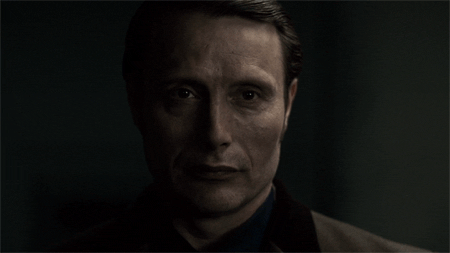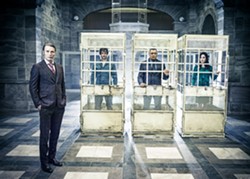Thursday, March 27, 2014
How putting its hero behind bars freed Hannibal to cut loose
In the age of improv-driven dialogue, so many dramas and comedies strike a tone by being loose and casual. We have hundreds of shows that feel natural and comfortable, like sweatpants and an old, ratty T-shirt.
But Hannibal, by contrast, is a tailored three-piece suit with a double Windsor knot. Not a wrinkle in sight, not a thread out of place. Absolutely everything, from its perfectly played banquet scenes, to its bloody tableaus, to the crisp carefully-phrased dialogue of the cannibal antagonist, is coordinated, starched and pressed.
It’s a show that recalls Se7en, if uncouth manners and untucked shirts were among the seven deadly sins.
In Silence of the Lambs, Hannibal Lecter was a caged monster. Here, he is too, but Lecter himself provides the cage. He’s cautious. It’s not like he’s driven by a fear of being caught — it’s just that getting caught would just be a so guache.
But all that cold precision can be wearying. To me, the show was icky but impressive — like a circus freak that can contort his limbs in disturbing ways — more than engaging or entertaining. I’m not alone, either. Time magazine critic James Poniewozik kicked off an interesting TV critic discussion recently by tweeting: “I keep trying to make myself like rather than just admire Hannibal, so at this point I think I just need you to tell me what's wrong with me.”
In that first season, I felt the same way. Credit that dislike, a little bit, to my natural repulsion to gore and horror. Not only do I not enjoy the notion of movies like Saw, I’m a little frightened and judgmental that there are people out there who do.
But more so, I think, it was that so little of the show’s escalating despair, grime and tension was cut by victory or relief: Evil was strong. It consumed, in every sense of the word.
Good, meanwhile, remained Oblivious or Weak.
That weakness was embodied by FBI special investigator Will Graham (Hugh Dancy.) He has an empathy disorder that manifests — as they tend to do on shows like this — as a superpower of sorts. He’s able to put himself in the blood-soaked shoes of the most twisted serial killers. He imagines — in a visceral, visual way — them killing their victims, with every eye-gougingly gory detail and feels the pleasure they feel in doing so. It takes a lot out of him. It takes everything out of him.
The story of Season 1 is the story of Graham’s march toward madness, with hallucination seeping into reality bleeding down toward nightmare. Dancy played Graham with the bleary haze of someone who hadn’t slept in five days and hasn’t eaten in twenty. You fear an errant autumn leaf will lazily drift down from the sky and knock him out cold.
And as the season progressed, he gets even worse. He begins losing track of time, in the most literal ways: His consciousness begins to skip forward, a la the protagonist from Jess Walter’s award-winning novel, The Zero. Even his drawings of clocks are skewed, with the numbers sloughed off to one side, out of frame.
And frankly, it was difficult to watch. The madness ate away at the show. Insanity, odd as it sounds, needs to be grounded in some sense of reality for the viewer to connect with it, and it increasingly wasn’t on Hannibal. Our hero looked like he could barely breathe — and, no wonder, the show’s atmosphere felt suffocating. It was intentional. It was well-done. But it wasn’t much fun.
But then the season finale hit: Graham begins to realize exactly what sort of monster Lecter is, right about the time Lecter frames him for murder.
So in Season 2, we open with a dramatically different status quo. Now, the tie has been loosened. The sleeves have been rolled up, and there’s a drop of blood splashed on the lapel. Hannibal’s deft fingers are curled into fists, and it’s ready to throw down.
That’s because Will Graham is in prison.
Shows that put their lead in prison often struggle with the new settings. Sons of Anarchy put anti-hero Clay Morrow behind bars, when he really should have been killed a season ago, wasting time in a long-expired plotline. Justified’s weakest plotline in this often-weak season has been Ava Crowder’s stint in prison.
By limiting where the character can go, the shows usually limit the character’s agency. But Hannibal defies the trend. Graham now has more agency than ever.
It’s a winking role reversal of the movie that has long since embedded itself into the American canon: For now, Lecter is the hero investigator. Graham is the caged dangerous animal. He’s the one pacing about his cell. He’s the one being experimented on by the skeevy Dr. Frederick Chilton. And he’s the one pulling strings, manipulating others into position with a few choice words.
For the first time, he’s clear-eyed, full-hearted. He’s through the worst of the mental illness. He’s been broken down, and rebuilt. Yes, he still has those creepy hallucinations, but they provide light instead of darkness. They help him understand what’s really going on. Now, it’s a battle between equals. You believe Graham stands a chance of taking down the cannibal psychologist.
The paradox — free a character by limiting him — makes sense when you look at it dramatically: Were Graham free and trusted, it would not be difficult for him to defeat Lecter. To keep Lecter a free man, Graham needed to remain ignorant about Lecter’s true nature (which would increasingly defy credibility for a genius like Graham) or he needed a serious handicap.
Imprisonment is that handicap.
In a sense it adds to the horror: You know who the monster is, and you know he’s still out there. But who’s going to believe you? You’re the guy in the jumpsuit, the guy in a jail cell, the guy accused of murder. He’s the respected psychologist with impeccable taste in music, art and fashion — and a damn good cook.
But where Graham was up to his neck in the slough of despondency last season, he seems mostly free of despair this season. (Dreams of death by electric chair aside.) He can breathe. He’s buoyed by the epiphany that, while he may be crazy, he’s also crazy right. He begins to understand how much of his mental breakdown was actively catalyzed by Lecter. He makes his skeptical colleagues into his allies. He turns one of his tormenters into an unwitting tool.
Naturally, his increased confidence and willingness to manipulate comes at a price: Set on Lecter’s trail by Graham, one of Graham’s allies stupidly stumbles into Lecter’s lair without backup, violating the most basic principles of Don’t Go In There 101, and paying for it with her life.
It’s a dynamic more fascinating, and frankly fun-to-watch, than all that brooding and angst of last season. And at the same time, Lecter’s become more interesting to watch as well. With his nemesis/patient/friend kept under lock and key, Lecter is willing to take more risks. His dark playful side is free to roam — he turns another serial killer into a part of the killer’s own morbid art installation. And, in last week’s episode, the series reaches its peak with a bold, philosophically fascinating moment where, instead of playing a cruel god by taking life, Lecter plays a cruel god by giving it.

In a few moments in the first season, Lecter lets a smirk — smug, knowing, wryly sinister — play across his lips. This season, the smirk is nearly constant.
But this time, Graham is smirking back. And Hannibal is better for it.
Tags: Hannibal , Television , NBC , TV , Image






















